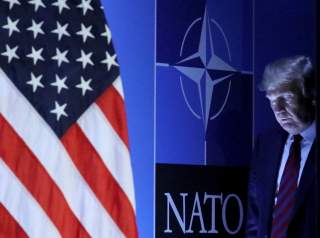Trump Should Have Already Left NATO
NATO was an institution to deal with the Cold War; it is obsolete for the conditions of the twenty-first century, and it has become a dangerous albatross around the neck of the American republic.
Abandoning the vain quest for U.S. global primacy includes no longer attempting to dominate Europe’s security affairs. The United States is badly overextended, militarily, politically and economically around the world. Embracing a more limited, selective role that focuses on a reduced roster of policy goals is essential. One of the earliest, and most feasible, places to offload excessive responsibilities is Europe.
To do that, American leaders should propose a new relationship with an independent European security organization. The European powers must address security challenges on their own and learn to live with the results. It does not help for the United States to encourage, if not insist upon, continued European dependence on U.S. protection—and continued deference to Washington’s dominance. That approach merely retards the needed steps toward greater European policy independence and responsibility. American leaders need to encourage that maturation, not obstruct it.
Washington should pursue a strategy to implement an orderly, but prompt, transfer of responsibility for Europe’s security to the nations of democratic Europe. The ultimate goal should be to phase-out U.S. membership in NATO—an alliance that is showing multiple signs of dysfunction. The initial step would be to withdraw U.S. military forces from the European theater. Within two years, the United States ought to complete the withdrawal of all ground units and reduce its naval and air forces in Europe by at least 50 percent. On the seventy-fifth anniversary of the North Atlantic Treaty in 2024, Washington should complete that withdrawal and give a one-year notice that it is terminating U.S. membership in the treaty. The option of occasional deployments of U.S. air and naval units should be kept open, based on the specifics of any agreements with the responsible European security organization or individual major powers, and Washington’s own assessment of the overall security environment. Care must be taken, though, that periodic, limited deployments do not become perpetual, large-scale “rotational” deployments that amount to a permanent U.S. military presence in all but name.
Unfortunately, the desperation of NATO partisans to preserve their institution is intense. The House of Representatives’ passage of the NATO Support Act in January 2019, barring the use of funds to facilitate U.S. withdrawal from the alliance in any way, is symptomatic of that attitude. The constitutionality of such legislation is highly suspect, since presidents throughout history have enjoyed wide latitude regarding both troop deployments and continued adherence to treaties. A transparent congressional attempt to usurp that authority and seek to micromanage U.S. foreign policy is both unwarranted and unhealthy. Whoever occupies the White House in the future must have the right to implement needed policy changes regarding NATO.
Great wailing and despair from the NATO preservation crowd on both sides of the Atlantic will inevitably accompany any meaningful U.S. policy shift. But seven decades is an exceedingly long period for any policy to be relevant and beneficial (much less optimal), and America’s NATO membership is no exception. Indeed, it seems to epitomize the problem of policy entropy. A U.S.-led NATO is now well beyond its appropriate expiration date. It is time to accord the alliance the retirement celebration that should have been held when the Cold War ended and the Soviet Union dissolved.
Adopting a new, more restrained posture does not mean that the United States will take no interest in Europe’s affairs. We need to reject the simplistic “light switch model” of America’s engagement in the world—that there are only two possible settings: “off and on.” There are many settings between those two extremes, and there are multiple forms of engagement—diplomatic, economic and cultural, as well as security.
Every effort should be made to preserve a robust, mutually beneficial transatlantic economic relationship. The United States also can and should maintain extensive diplomatic and cultural connections with Europe. And Washington should forge a coordinating mechanism either with a new European security organization or on a bilateral basis with the continent’s main military powers to address issues of mutual concern. Beyond that aspect, there is nothing to prevent joint military exercises and even temporary deployments of U.S. air and naval units, if the security environment turns more threatening. But America does not need to continue being Europe’s security blanket/hegemon.
That more flexible approach would constitute an updated version of Taft’s policy of the free hand. Moreover, it would be one component of a U.S. global grand strategy based on realism and restraint. America would no longer shackle itself to commitments that have more drawbacks than benefits and lock the republic into obligations that no longer make sense. It would end the thankless, unproductive strategy of trying to micromanage the security affairs of both Europe and the neighboring Middle East. It is perverse for U.S. leaders to seek to deny their own country the essential element of policy choice. A sustainable transatlantic policy for the twenty-first century must rest firmly on the principle of maximum choice for the United States.
Ted Galen Carpenter, a senior fellow in security studies at the Cato Institute and a Contributing Editor to the National Interest, is the author of twelve books on international affairs, including several books on NATO.
Image: Reuters

